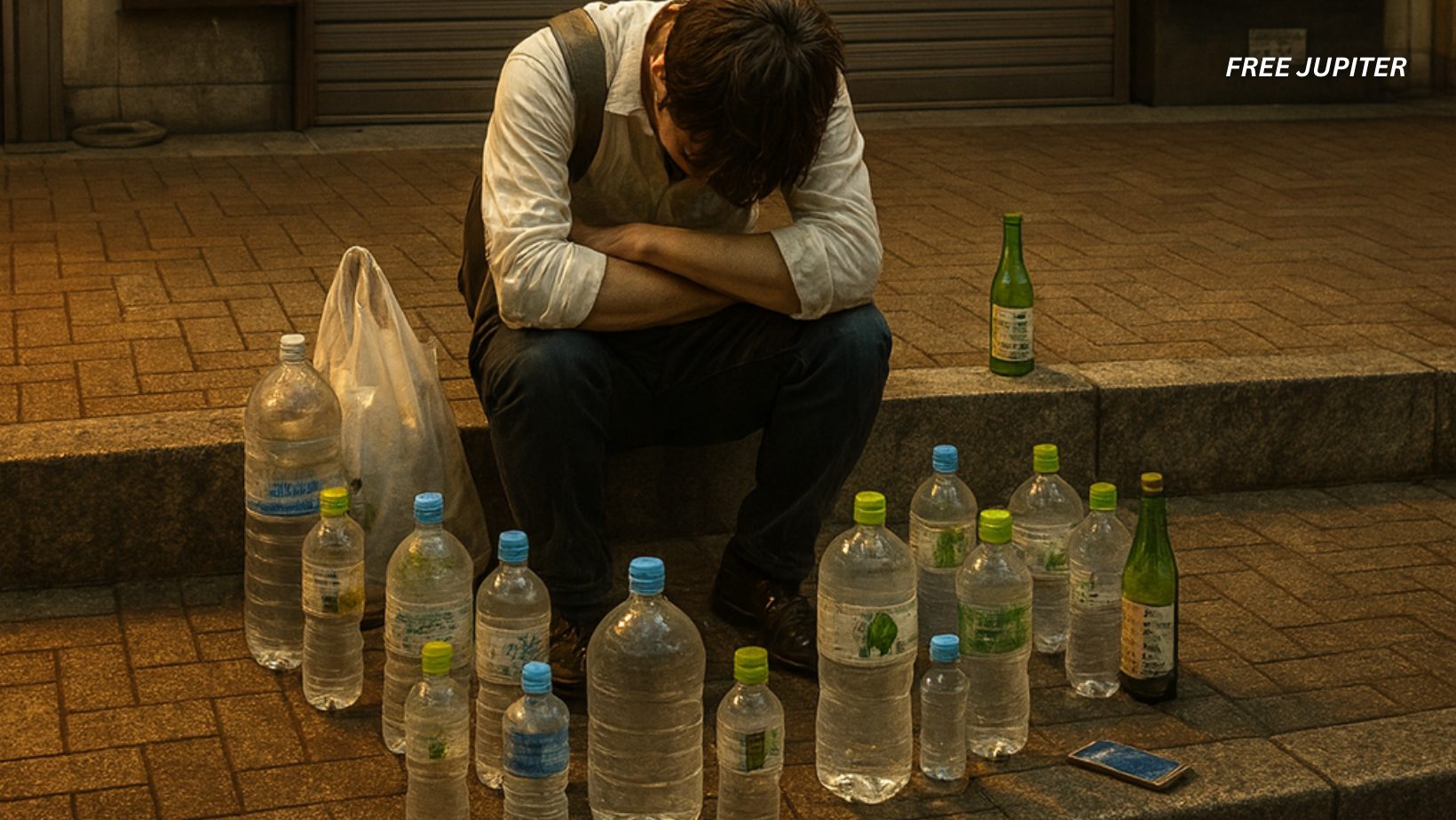In many countries, stumbling across a person asleep on the pavement late at night might trigger alarm, suspicion, or even calls to emergency services. In Japan, however, such a sight often draws little more than a passing glance. In cities like Tokyo or Osaka, where nightlife and after-work drinking are part of the social fabric, spotting someone stretched out on a sidewalk, snoozing after one too many glasses of sake, is not unusual.
What makes this phenomenon intriguing is not the act itself, but the cultural reaction to it. Rather than being ridiculed, harassed, or shamed, these individuals are often left undisturbed. Sometimes, strangers even go out of their way to offer small gestures of kindness—like leaving a bottle of water nearby, or marking a circle of water around the person so they can rehydrate upon waking. To outsiders, this may appear puzzling, even whimsical. But beneath the surface, it reveals deeper insights about Japanese attitudes toward respect, empathy, and the way society quietly supports its members, even in moments of vulnerability.
This article unpacks this curious practice and explores what it says about Japanese culture, social values, and the subtle ways kindness can take shape in unexpected places.
1. Drinking Culture in Japan: More Than Just Leisure
Drinking in Japan is deeply tied to social connection. After-work gatherings, known as nomikai, are common for colleagues. These sessions allow people to relax, speak more openly, and bond outside the rigid hierarchy of the office.
Because alcohol is central to these occasions, overindulgence is not unusual. Add in Japan’s train system, which stops running around midnight, and it becomes easy to see why many people end up stranded until morning. Long workdays combined with missed trains often lead to street-side naps.
Importantly, this isn’t typically associated with homelessness but with nightlife and circumstance. Falling asleep outdoors becomes a side effect of social rituals and city logistics.
Read more: Psychology Says These 13 Habits Make People Instantly Respect You More
2. Public Safety and the Unspoken Trust Factor
One reason this behavior is tolerated in Japan has to do with the country’s reputation for public safety. Japan consistently ranks among the safest nations in the world, with low crime rates compared to many other countries. Petty theft and harassment are far less common, which makes the act of sleeping in public less risky than it would be elsewhere.
The fact that people feel they can fall asleep in a vulnerable position without serious fear speaks volumes about the underlying trust embedded within Japanese society. Even strangers are expected to maintain a certain level of courtesy toward one another. This sense of mutual respect creates an environment where individuals can be left alone, even when incapacitated by alcohol.
For visitors who are accustomed to associating public drunkenness with danger, ridicule, or crime, seeing this level of safety may be both surprising and reassuring.
3. Respecting Vulnerability: The Choice Not to Shame
In many countries, someone passed out on the street would be judged or mocked, often photographed and shared online. Japan approaches it differently. Leaving a sleeper undisturbed is seen as an act of respect, preserving their dignity rather than exposing their misstep.
This attitude reflects a cultural emphasis on avoiding public embarrassment. Social harmony often means protecting others from shame, even when their behavior isn’t ideal. By ignoring or quietly walking past, people uphold an unspoken agreement: everyone deserves dignity, even in unflattering moments.
4. Quiet Gestures of Kindness: Water and Circles
Beyond simple tolerance, there are also small acts of care. Some passersby leave a bottle of water beside a sleeper, anticipating the hangover to come. In rarer cases, a circle of water is poured around them—both practical, as a way to keep space clear, and symbolic, as a sign of protection.
These gestures are understated. There’s no announcement or expectation of gratitude. Instead, the focus is on making life a little easier for a stranger. It reflects a style of empathy where kindness is expressed subtly, without drawing attention to either the giver or the receiver.
Read more: These 11 Phrases Instantly Shut Down Disrespect Without Raising Your Voice
5. Cultural Contrasts: How Other Societies Respond
Looking at other countries highlights the uniqueness of Japan’s approach. In many Western nations, public intoxication is treated as a nuisance or crime, sometimes resulting in fines or arrest. In others, someone asleep in public might be assumed homeless or in serious medical trouble, prompting direct intervention.
In places with higher crime rates, falling asleep on the street would be considered reckless. But Japan’s tolerance comes from a mix of safety, cultural values, and acceptance of human imperfection. Rather than framing the act as shameful, it is treated as a temporary lapse that doesn’t define the person.
6. What This Reveals About Japanese Social Values
On the surface, the practice might look like little more than an odd nightlife quirk. But at its core, it reflects deep cultural values: respect for dignity, empathy in small acts, and the importance of social harmony.
The fact that people can rest in public without fear demonstrates collective trust. The willingness to quietly help, even through something as simple as leaving water, shows a preference for subtlety in kindness. It’s an acknowledgment that while everyone makes mistakes, those mistakes don’t erase someone’s humanity.
Read more: If Someone Says These Things, They Might Not Actually Respect You
Final Thoughts: A Lesson in Everyday Empathy
At first glance, the sight of someone asleep on a Japanese street after a night of drinking may appear strange, amusing, or even concerning. But when viewed through the lens of cultural values, it becomes something much more meaningful. It illustrates how a society can balance tolerance, safety, and kindness in a way that preserves dignity even in awkward situations.
This practice does not suggest that drinking excessively is encouraged or without consequences. Rather, it highlights how people deal with those consequences when they arise. Instead of shame or punishment, there is patience. Instead of scorn, there is respect. And in small gestures—like a bottle of water left beside a stranger—there is empathy.
In a world where vulnerability is often met with judgment, the Japanese approach offers a gentle reminder: kindness does not always need to be loud, and dignity can be preserved even in the most unflattering circumstances. Sometimes, humanity is found not in dramatic acts of heroism but in the quiet decision to let someone sleep in peace.
Featured image: GPT-5o Recreation.
Friendly Note: FreeJupiter.com shares general information for curious minds. Please fact-check all claims and double-check health info with a qualified professional. 🌱










